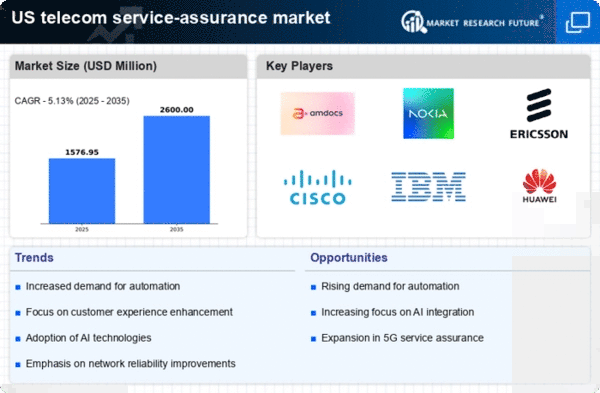Emergence of 5G Technology
The rollout of 5G technology significantly impacts the telecom service-assurance market, as it introduces new challenges and opportunities for service providers. With the promise of faster speeds and lower latency, 5G networks require robust service-assurance mechanisms to ensure optimal performance. By 2025, it is projected that 5G subscriptions will reach 1 billion in the US, compelling telecom operators to adopt advanced monitoring tools. These tools are essential for managing the complexities of 5G networks, including network slicing and edge computing. As a result, the telecom service-assurance market is likely to expand, driven by the need for enhanced performance management and quality assurance in 5G environments.
Focus on Regulatory Compliance
Regulatory compliance remains a critical driver for the telecom service-assurance market, as service providers navigate a complex landscape of industry standards and regulations. In 2025, it is projected that compliance-related expenditures will account for approximately 15% of telecom operators' budgets. This focus on compliance necessitates the implementation of robust service-assurance frameworks that ensure adherence to regulations while maintaining service quality. As operators strive to meet these requirements, the demand for specialized service-assurance solutions is likely to increase, further propelling growth in the telecom service-assurance market.
Increased Cybersecurity Concerns
The growing prevalence of cyber threats poses a significant challenge for the telecom service-assurance market. As telecom operators face heightened risks of data breaches and service disruptions, the demand for comprehensive security measures becomes paramount. In 2025, it is anticipated that cyberattacks on telecom networks will increase by 30%, prompting service providers to invest in advanced service-assurance solutions that incorporate cybersecurity features. These solutions not only monitor network performance but also safeguard against potential threats, ensuring the integrity of services. Consequently, the telecom service-assurance market is likely to witness growth as operators prioritize security alongside performance management.
Shift Towards Cloud-Based Solutions
The transition to cloud-based solutions is reshaping the telecom service-assurance market, as service providers seek to enhance operational efficiency and scalability. By 2025, it is expected that over 60% of telecom operators will adopt cloud-based service-assurance platforms, allowing for real-time monitoring and analytics. This shift enables operators to respond swiftly to network issues and optimize resource allocation. Furthermore, cloud-based solutions facilitate collaboration among teams, improving overall service delivery. As a result, the telecom service-assurance market is poised for growth, driven by the increasing adoption of cloud technologies and the demand for agile service management.
Rising Demand for Network Reliability
The telecom service-assurance market experiences a notable surge in demand for network reliability, driven by the increasing reliance on digital communication. As businesses and consumers alike depend on uninterrupted connectivity, service providers are compelled to enhance their network performance. In 2025, it is estimated that 75% of organizations prioritize network reliability as a key performance indicator. This trend necessitates the implementation of advanced service-assurance solutions to monitor and optimize network performance, ensuring minimal downtime and improved user satisfaction. Consequently, telecom service-assurance market players are investing in innovative technologies to meet these expectations, thereby fostering growth in the sector.
















